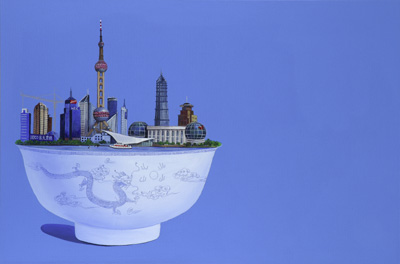 Zhang Tingqun: Untitled (Shanghai) Oil on canvas, 100 x 150 cm Pham Ngoc Duong, Zhang Tingqun, Xu Yihui Click for English text Pham Ngoc Duong, geboren 1976, studierte an der Hochschule für Künste in Hanoi. Seine Arbeiten wurden in internationalen Ausstellungen in Vietnam, Frankreich, den USA und Japan gezeigt. Er lebt heute in Hanoi und in Frankreich. Seine aktuellen Arbeiten auf Leinwand nehmen Leid und Schmerz von Menschen in den Blick, deren grosse physische und emotionale Präsenz geradezu "unter die Haut" führt. Wiederkehrend ist diesen Menschen ein Stempel aufgedrückt, welcher an das traditionelle asiatische Symbol für ein glückliches und langes Leben erinnert. Für Pham Ngoc Duong steht dieses Symbol in einem weitgefassten - und negativen - Sinne für Tradition als solche: für den Druck und die oft schmerzvollen Zwänge, welche traditionelle Lebensweisen den Menschen noch immer aufbürden. In den Augen Pham Ngoc Duongs können sich die Menschen aller Generationen und Gesellschaftsschichten in Vietnam diesem Druck der Traditionen nur schwer entziehen. Xu Yihui wurde 1964 in Lian Yungang / Jiangsu geboren. Nach seinem Kunststudium in Nanjing und Peking lebt und arbeitet er in Peking. Er beteiligte sich an zahlreichen wichtigen Ausstellungen, u.a. in der China National Gallery, Peking (1989), im Victoria and Albert Museum, London (1998), im Kunstmuseum Bern (2005) und der Hamburgeramburge Kunsthalle (2006). Xu Yihuis Porzellanskulpturen könnten in einem Souvenirladen als gewöhnlicher Kitsch erscheinen. Im künstlerischen Kontext zielen sie auf eine Auseinandersetzung mit den sozialen Veränderungen, welche die Ankunft der Konsumgesellschaft in China provoziert. In seinem jungen Leben erlebte Xu Yihui bereits die Chinesischen Revolution, die Reformbewegung, sowie die Öffnung Chinas im globalisierten Kontext. In einem Koffer angefüllt mit Porzellangeld oder in der Darstellung des berühmten Propaganda-Buches von Mao, dem "roten Buch", kann Xu Yihui Vergangenheit und Gegenwart zusammenführen, oft mit einem kritischen Blick auf konsumistische Tendenzen der Gesellschaft. Zhang Tingqun, 1981 geboren, studierte bis 2002 an der renommierten Kunstakademie in Sichuan, China. Seit 2003 werden seine Arbeiten in China regelmässig ausgestellt. Avanthay Contemporary freuen sich, seine Arbeiten zum ersten Mal auch dem europäischen Publikum präsentieren zu können. Zhang Tingqun arbeitet mit westlichen Ölfarben, trägt sie jedoch nach traditioneller, chinesischer Art auf. In seiner Serie "Constructing China" zeichnet er sein Land in einer Periode dramatischer Umwälzungen und legt dessen oftmals erratische Entwicklung dar. Bizarr und unharmonisch wachsen moderne Gebäude aus einer Teetasse, Baukräne strukturieren den vormals ruhigen Himmel. Die Arbeiten Zhang Tingquns geben der Hoffnung Ausdruck, dass kulturelle Ursprünglichkeit und Traditionen im Rausch der Modernisation nicht vollends untergehen. Ausstellung 24.8. - 29.9.2007 Oeffnungszeiten Di-Fr 12 - 18 Uhr, Sa 11 - 16 Uhr Avanthay Contemporary Limmatstrasse 275 8005 Zürich Telefon +41 44 205 27 07 Fax +41 44 205 27 09 Email info@avanthaycontemporary.com www.avanthaycontemporary.com Pham Ngoc Duong, Zhang Tingqun, Xu Yihui The vietnamese artist Pham Ngoc Duong, born in 1976, studied at the Hanoi Fine Art University, Hanoi, Vietnam. He lives and works in Hanoi and France, and participated in international exhibitions in Vietnam, New York, Japan, and France. In his energetic, emotionally poignant works on canvas, he focusses on human faces in close vision, leading us almost "under the skin" of the persons portrayed. The recurrent stamp stands for the traditional Asian symbol for longevity and "som hi", happiness. The artist uses the stamp in a broader sense as an almost violent symbol for tradition as a whole, how traditional ways of life can put people of all generations and situations under pressure, causing pain and isolation. Thus, in this body of work, we see the girl, the pregnant woman, the man, the children, ... Xu Yihui, born in 1964 in Lian Yungang / Jiangsu, studied art in Nanjing and Beijing, and now lives and works in Beijing. He participated in many important exhibitions at the China National Gallery, Beijing (1989), Victoria and Albert Museum, London (1998), and the Kunstmuseum Bern, Switzerland (2005), amongst others. With his porcelain sculptures, Xu Yihui intriguingly reacts to new lifestyles in China, brought about by the arrival of globalized consumer culture. Xu Yihui's work seen in a souvenir store would appear as usual ceramic kitsch. However, in the art context, his work reveals a deep sensibility for social studies. In the decades of his young life, he lived through the Chinese Revolution, the Reform Movement and the opening of China in the context of globalisation. Using the famous propaganda-book of Mao, the red book, Xu is able to express memories and actuality in one, like Xu's red books burnt in a fireplace and put into a modern bookshelf. Xu Yihui thus juxtaposes past and present and includes a comment on consumerism, if not on the consumer of art. Zhang Tingqun is a Sichuan artist, who graduated from the Sichuan Academy of Fine Arts in Sichuan, China, in 2002. He began to exhibit in Beijing in 2003 and since then has been based there, yet his works have been shown travelling around in China. Zhang Tingqun very interestingly explores the clashes between old and new. He looks at how development, although progressive, does not necessarily replace what was there before. He uses Western style oils but applied with Chinese brushes. He is known for taking everyday scenes and using them to illustrate the collision between China and the West. In his series "Constructing China" (started in 2003), he depicts the nation as going through a period of dramatic change, and reveals it's erratic development. Strange and ugly, unharmonious buildings appear in his tea cup as traditional culture is ignored or damaged. Nowadays, construction cranes appear on the previously serene skyline. His works express the hope that the classic culture from the past will not completely vanish in the rush to modernisation. Exhibition 24 August - 29 September 2007 Gallery hours Tues-Fri 12 - 6 pm, Sat 11 am - 4 pm |